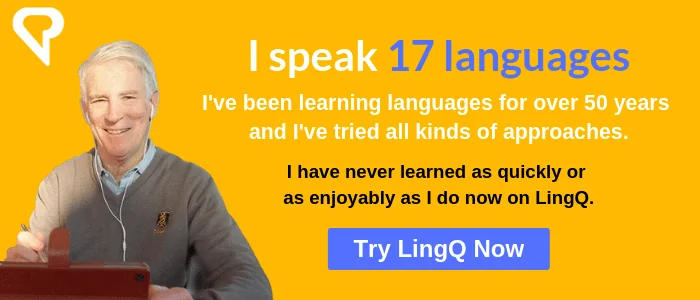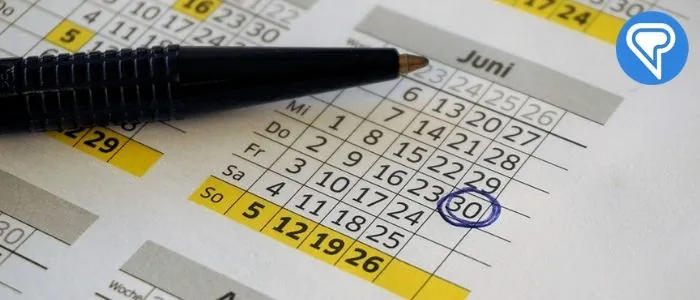Today I want to talk about three months because three months comes up quite often. We have our 90-day challenges at LingQ. I have done quite a few. I have done it in Polish, in Korean, in Arabic and Persian and maybe some other, I can’t remember. We had the 3 Months to Fluency that Benny the Irish Polyglot spoke of. It’s a period of time where we can sort of focus our energies and hopefully achieve something, so I want to talk a bit about that.
I had said that I was going to talk about learning more than one language at the same time or that I was going to talk about getting to speaking. Both of those things I want to talk about, but I want to talk about them next Thursday and I want to have a live streaming session such as we used to have. That means that we’ll go on for 45 minutes or however long. You will sign up and we’ll get the information out to you on how you can sign up. You can post your questions and I will answer those questions live. I want to focus it on the idea of sort of learning and maintaining several languages and the issue of getting to speaking. We can talk about those things at that live streaming event.
Now, the three months… What can we achieve in three months and how should we approach a three-month period of time. First of all, I will recount for you my recent experience in three months.
My wife and I went to Israel, so I got this t-shirt from the Hebrew University in Tel Aviv. I put in probably three weeks prior to going there into Hebrew. I would say that my Hebrew is nonexistent, even trying to read it. Whatever I did I’ve essentially forgotten. With Hebrew I only put in a few weeks, so if I start up again I’m almost starting at the beginning. I’ll be a little bit better because I’ll be refreshing things that I tried to do and so it will come back faster and stronger, but I have essentially zero there.
As a result of going to Israel, then my wife and I went into Jordan. We visited Petra and that made me think. Really, there’s an awful lot more Arabic speakers than Hebrew speakers. I’m going to learn Arabic. So as a result of starting to learn Hebrew, I was motivated to learn Arabic. This comes back to a point that I always have experienced in my life and that is you never know what’s going to lead to what. One and one doesn’t always equal two. The main thing is to actually do something and if you do something good things will happen.

I then went into Arabic off and on because I was traveling in Latin America, traveling in Ukraine and stuff, but I put in about seven or eight months into Arabic. Then I said I have now learned to read Arabic more or less. There are a lot of Persian speakers, Farsi speakers here in Vancouver, why don’t I learn Persian. So I spent essentially three months with Persian, at the end of which I did a brief video. Then my wife is watching Turkish soap operas on Netflix, so I said hey, I’d like to understand what they’re saying. So I got into Turkish and I’ve now spent about two months on Turkish.
Here is my feeling about three months. Three months is a good period, especially if you are starting a new language. Now, anyone that is starting a new language or has studied other languages is already by definition an enjoyment learner. That’s different from a Persian who needs English for their job. A person who needs English for their job, they’re going to be totally focused on English. In my case, I learn it because it’s enjoyable. What do I achieve in three months? Well, first of all, how.
I avoid too much time on grammar explanations because I don’t have any sense of the language. I certainly never do grammar exercises. I focus entirely on listening and reading and I focus on the mini stories because the first time I listen I’m just accumulating words. The first time I study these lessons I’m accumulating words and only slowly do I start to notice the different forms, the different functions of the different forms. Even today while cleaning up after breakfast I noticed certain things about Turkish verbs that I hadn’t noticed before.
However, the other day driving to the office I put in my Arabic. I listened to Arabic and I listened to Persian coming back from the office. I heard the words more clearly than I did before. In other words, spending time with Turkish has increased my ability to clearly hear these other languages. I’ve always found that studying new languages was kind of like an exercise for the brain, which improves your ability to hear other languages. However, obviously I have slipped. I’ve forgotten things, so I kind of end up with the following feeling about the first three months of a language.
You cannot achieve fluency in three months because fluency requires lots of practice using the language, speaking the language. Eventually, you have to speak a lot and you have to speak in meaningful situations, not just hello, how are you, where’s the bathroom, but talking about things of interest, a wide range of subjects, lots of speaking. Until you have had that you will not be fluent.
After three months you don’t have the vocabulary to engage in meaningful conversation and therefore it’s not practical to think that you can be fluent in three months. However, I have a level in Arabic, Turkish even and Persian, that I don’t slip that much. I listen to my Arabic. I listen to my Persian. I’m aware of certain structures in the language. I’m aware of vocabulary there. I’ve slipped some. When I go back to doing those languages, go back to some of the same content, some of the same mini stories, refresh what’s in my brain, I get right back to where I was and go forward.
The three-month period gives you that toehold. The language is now no longer strange. You have a certain amount of vocabulary, some of which you’ll forget but which you can quickly relearn. The culture and the people are no longer strange. Even if I watch people speak Arabic, Farsi and Turkish and I don’t understand what they’re saying, I have a sense of who they are. I have a sense of that culture. So I have this ability now by having Arabic was eight months, three months on Persian and two months on Turkish I have discovered this whole new world.
The goal of the first three months is not to achieve fluency. Even when, for example, as a Spanish speaker I learned Portuguese I put in more than three months. This was before we had Portuguese at LingQ, so I was using Living Language and stuff like that. But still, went to Portugal, I was dead. People just switched back to English, they didn’t have patience for me. I had to put in more time, then I went to Portugal and then slowly I started getting enough interaction with people. Even today I don’t really call myself tremendously fluent in Portuguese because I mix in so much Spanish or Italian or whatever.
So three months is a key period to, first of all, get that sense that you can learn the language and get some sense of achievement, some sense of familiarity with the language. Don’t worry about how correctly you use the language. It won’t matter until you’ve come across these same words and phrases in different situations and you start to notice the function of different words. You can, of course, look up grammar when you’re curious and I do that. Just today I Googled noun cases in Turkish or verbs in Turkish or suffixes in Turkish. You can always refer to these sources and maybe refer to several different sources. Then you go back to your reading and listening and you start noticing different things, but fluency is not the goal. The goal is to say okay, I now have a toehold in this language. I have a better understanding of the culture. It’s something that I have with me that I can always go back to whenever I want. That’s what we want to achieve with that first three month period.
I have a number of these now on the back burner of Greek, Romanian. I don’t have enough time, obviously, to bring them all up to the level that I’d like to be at, but whatever I have put into those is well worth it, was time well invested. That’s basically all you can expect to do in your first three months with a language.
Thank you and remember, next Thursday we have a live streaming session and I look forward to seeing you there. We will be providing information on how you can participate. Bye for now.








2 comments on “First 3 Months Fluency is NOT the Goal”
Comments are closed.
I agree with everything you said Steve, great article once again.